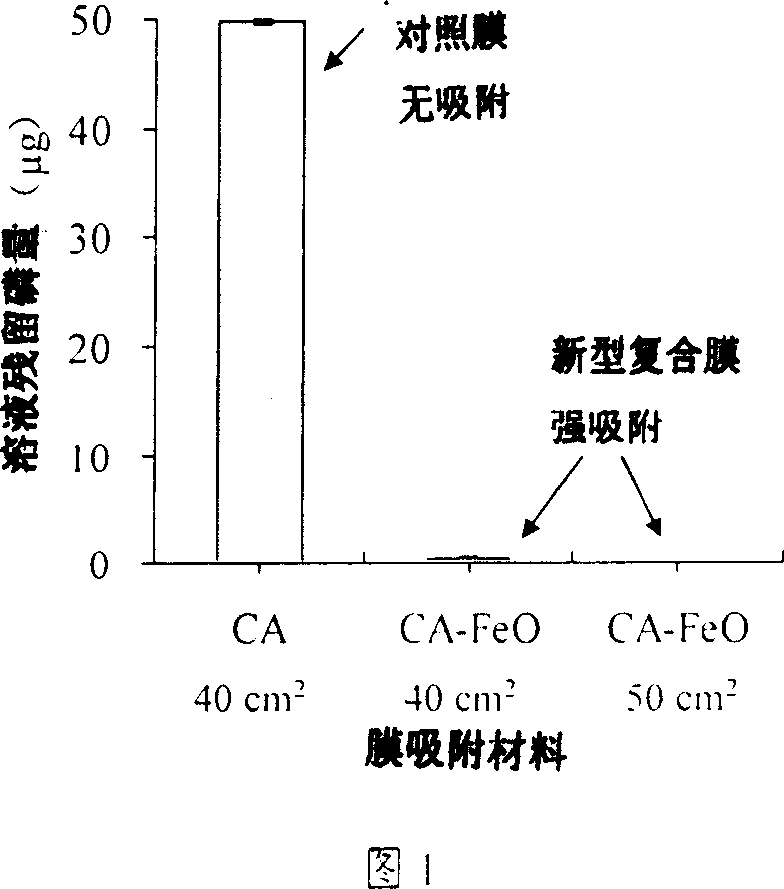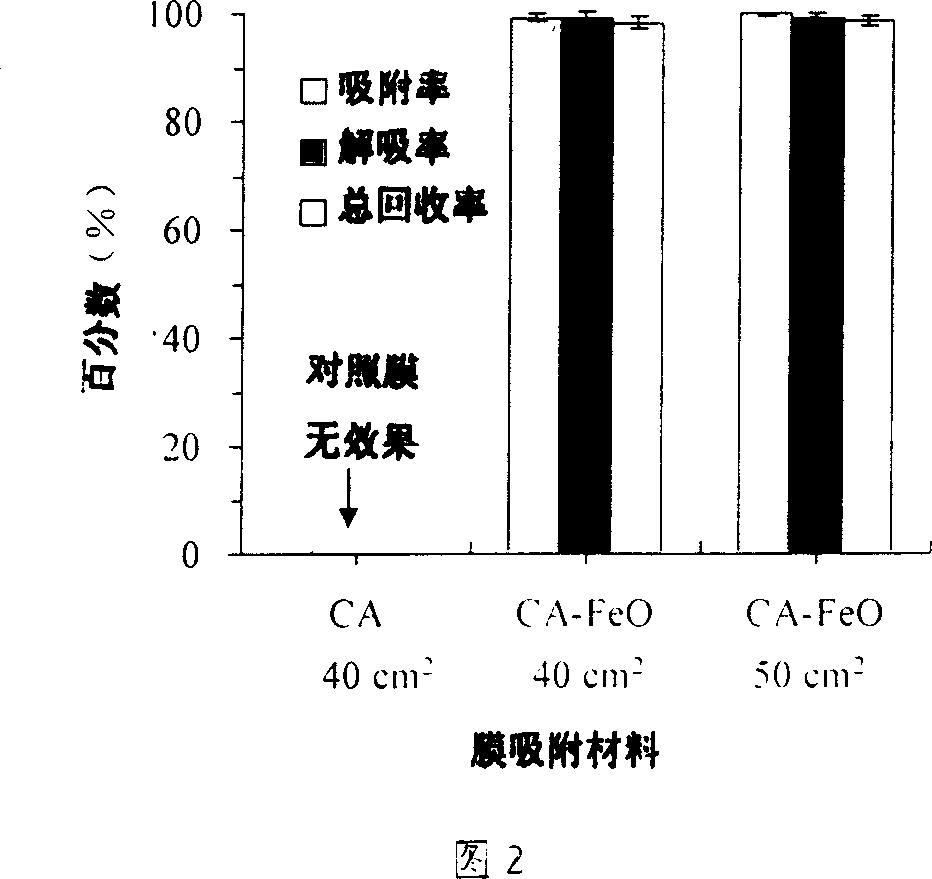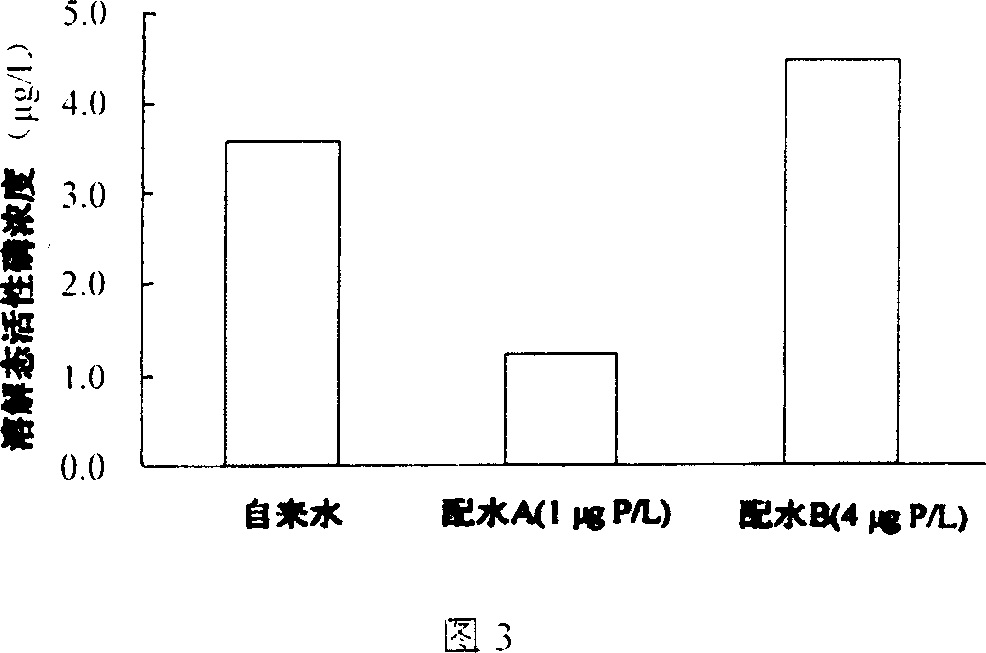Acetyl cellulose/Fe-Al oxide composite membrane, and its preparing method and use
A technology of cellulose acetate and iron oxide, applied in chemical instruments and methods, membrane technology, semi-permeable membrane separation, etc., can solve problems such as difficulty in separating error resin particles and soil particles, and achieve leakage prevention, convenient preparation, and easy realization. Effect
- Summary
- Abstract
- Description
- Claims
- Application Information
AI Technical Summary
Problems solved by technology
Method used
Image
Examples
Embodiment 1
[0029] A cellulose acetate-iron oxide composite membrane was prepared, and its composition (in mass percentage) was: 93.7% of cellulose acetate, 6.3% of iron oxide (in Fe 2 O 3 count).
[0030] The method for preparing the above-mentioned cellulose acetate-iron oxide composite membrane comprises the following steps:
[0031] (1) The experimental film formula is as follows: 18 g of cellulose diacetate; 10 g of dioxane; 70 g of acetone; 2 g of magnesium perchlorate; 3 ·6H 2 0); The said material is mixed in the triangular flask with the ground stopper to prepare the casting liquid;
[0032] (2) Homogenize the film casting liquid: place the triangular flask containing the above-mentioned prepared film casting liquid in a constant temperature shaking box, keep the temperature between 25°C and 45°C, and shake until the film liquid is completely dissolved and uniform, that is, The casting liquid of the cellulose acetate / iron oxide composite membrane can be prepared evenly;
[0...
Embodiment 2
[0038] Another cellulose acetate-iron oxide composite membrane was prepared, and its composition (in mass percentage) was: 97.5% cellulose acetate, 2.5% iron oxide (in Fe 2 O 3 count).
[0039] The preparation method of the composite membrane is as follows: the formula of the composite membrane is as follows: 22 g of cellulose diacetate; 6 g of dioxane; 68 g of acetone; 2 g of magnesium perchlorate, ferric chloride (FeCl 3 ·6H 2 0) 2g; the operation steps are the same as those in Example 1, except that the step (2) homogenize the casting solution: the temperature is kept at about 35°C; Evaporate and dry for 60 seconds in an oven at 35 °C; immerse the prepared film liquid layer together with the scraper in 1% ammonia water, keep the temperature at 20 °C ~ 25 °C, and soak for 7-10 minutes to promote the iron oxide particles in formed in the film, and a cellulose acetate / iron oxide composite film was obtained at this time. The basic physicochemical properties of the resulting...
Embodiment 3
[0041] Then prepare a cellulose acetate-iron oxide composite membrane, and its composition (in terms of mass percentage) is: 87% of cellulose acetate, 13% of iron oxide (in terms of Fe 2 O 3 count). The experimental film formula is as follows: cellulose diacetate 16g; dioxane 10g; acetone 70g; ferric chloride (FeCl 3 ·6H 2 0) 8g; Operation steps are the same as in Example 1. Most of the physical and chemical properties of the obtained film are similar to those of the film prepared in Example 1, and the ash content is slightly higher, about 16% to 23%.
PUM
| Property | Measurement | Unit |
|---|---|---|
| thickness | aaaaa | aaaaa |
| mechanical strength | aaaaa | aaaaa |
Abstract
Description
Claims
Application Information
 Login to View More
Login to View More - R&D
- Intellectual Property
- Life Sciences
- Materials
- Tech Scout
- Unparalleled Data Quality
- Higher Quality Content
- 60% Fewer Hallucinations
Browse by: Latest US Patents, China's latest patents, Technical Efficacy Thesaurus, Application Domain, Technology Topic, Popular Technical Reports.
© 2025 PatSnap. All rights reserved.Legal|Privacy policy|Modern Slavery Act Transparency Statement|Sitemap|About US| Contact US: help@patsnap.com



